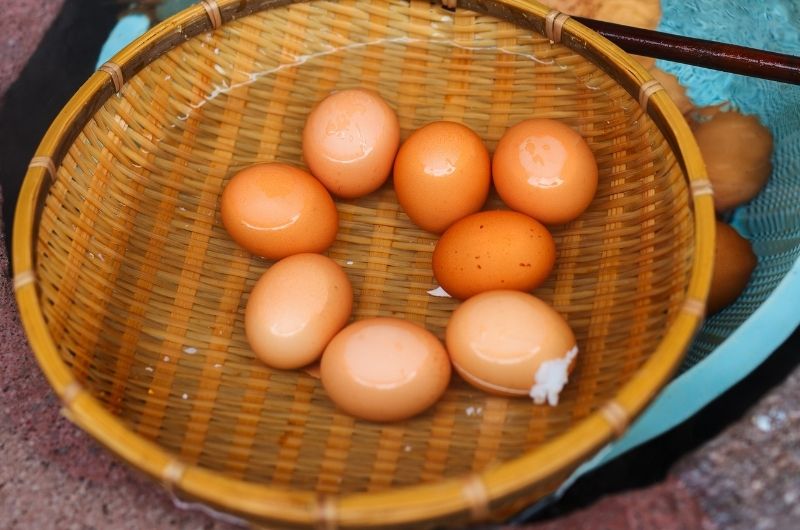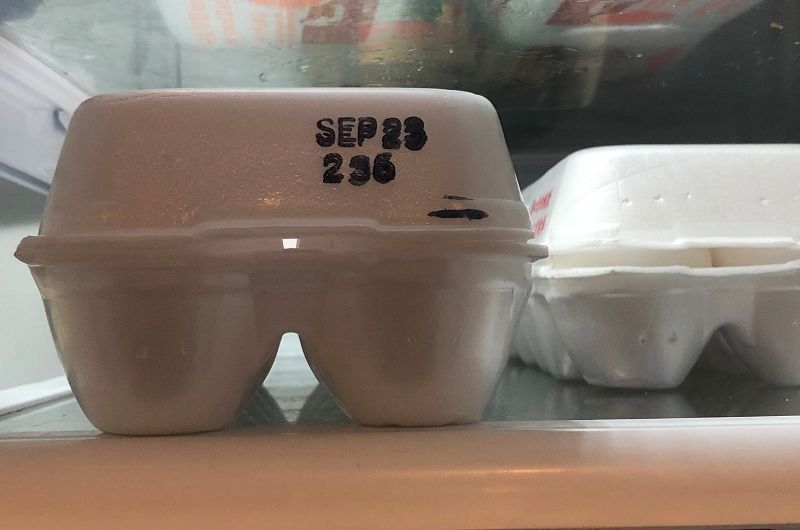Have you ever cracked open a bunch of eggs to make a delicious omelet only to discover one egg has expired? Maybe you’re baking a cake and notice that the expiry date on the egg carton was a couple of days ago. Or maybe you just saw a carton of eggs in the back of your fridge after some time.
Do you throw the whole mixture away and start over, or is it okay to go ahead and keep cooking? After all, it might be a waste of good food to throw out an entire cake for just one expired egg. How exactly do you know when an egg is no longer edible? Are there any side effects of eating an expired egg? Is the date on the carton always correct?
Yes, you can eat an expired egg with no consequences at all. But always make sure your eggs haven’t expired to the point of becoming a bad egg. Eggs usually take a very long time to go bad. The eggs are at their freshest before the expiration date, but this does not mean you cannot eat them. If you have kept the eggs refrigerated, you can use the eggs for about 2 weeks past the expiration date.
The expiration date on egg cartons
You might wonder why egg cartons have an expiration date on them if you can eat eggs even a week or two past this date.
The answer is simple. The expiry date is almost always a date when the store has to take the eggs off their shelves. People rarely eat an entire carton of eggs in a couple of days, so the expiry date lets the store know that these eggs are only good for another week or two. It’s time to take them off the shelf because they might go bad by the time people get around to eating them.
Another reason you can eat eggs after the expiration date is that the expiry date is based on the egg’s freshness and quality. This does not mean eating an expired egg tastes bad or has any health concerns. After all, some food such as meringues recommends using older eggs over fresh.
But if you still feel uneasy about eating an expired egg, these tips will help you know for sure if there is anything wrong with the egg.
Spotting a bad egg from an expired egg
There are a couple of reliable ways to know when your eggs have gotten so old that they simply can’t be eaten.
The float test

This is a well-known test and for a good reason. It is straightforward to do and usually right. All you have to do is drop the egg in a bowl of water. If the egg sinks, it’s good to eat. If it floats, then you better throw it away. This test’s advantage is you don’t have to break the egg to see if it’s edible, meaning less of a mess to clean up.
Let’s take a quick look at the science behind this method. Eggshells are porous. They have small holes through which air can pass through. So when an egg grows older, the air inside the egg increases. This, in turn, makes the egg float when you drop it in water. The fresher the egg, the lesser the air inside the egg, causing it to sink to the bottom of the water bowl.
A floating egg means the egg is somewhat old. But this does not guarantee that the egg is bad and cannot be eaten.
The plate and sniff test
As the name suggests, you have to break the egg onto a plate and smell it. When you break the egg, if the yolk breaks as well and the egg is very runny, it is a sign that the egg is very old and about to go bad. In this situation, it’s better just to get a new egg.
But if the egg yolk is still firm and the egg white isn’t too runny, then this egg can be used. A bad egg is very easy to identify as soon as you break it because of the terrible smell it gives. A good egg has very little smell even if it is old, so once the egg is broken, you can get a much better idea if the egg can be eaten or not.
You might notice that the eggs shell is cracked or slimy compared to the other eggs. This is a good sign that this egg is bad. If you still want to make sure, you can always crack the egg very carefully to smell its inside. But be warned, if the egg is bad, the smell can be quite nauseating.
The risks of eating a bad egg

Now you may have cracked open a few eggs into a bowl, and when adding the last egg in, you notice a terrible smell. It seems the last egg you added was a bad egg, but now it’s too late. It’s mixed with the other good eggs. Does this mean you have to throw away the entire mixture? Unfortunately, yes.
If you eat a bad egg, there is a very good chance you will get Salmonella. Salmonella might sound like a fancy food, but it’s a very troublesome bacterial infection. This infection comes with diarrhea, vomiting, stomach cramps, and a fever, which can go on for a few weeks.
Sometimes the person only experiences these symptoms for a few days but if the infection spreads past your intestines, it might create life-threatening complications.
So if you tested the egg with the float test, cracked it open, and still aren’t sure if it’s bad, it’s much better to simply throw the egg away rather than risk your health for a few eggs.
Keeping your eggs fresh – The do’s and don’ts
Prevention is better than the cure. Making sure an old egg is still edible is always a good idea. But an even better idea is to make sure your eggs are stored properly stored and not spoiled.
Let’s take a look at what we can do to make sure our eggs don’t go bad.
| Do | Don’t |
| Chose the eggs with the latest expiry dates | Purchase eggs that have expired already |
| Purchase the eggs from a refrigerated store | Purchase eggs that have been kept at room temperature or above |
| Check all the eggs to make sure none are broken | Purchase a carton without checking the eggs |
| Keep the eggs refrigerated once purchased | Store eggs outside the refrigerator |
| Store the eggs deep inside the refrigerator | Store the eggs in the refrigerator door |
| Purchase eggs for a couple of weeks at a time | Purchase eggs for a couple of months at a time |
The above guidelines should give you a much better chance of never even having to test if an egg is too old to be eaten or not.
Other creative uses for old eggs
Once you decide an egg is simply too old to be eaten, you can use these methods to still get some use out of these old eggs.
- Using older eggs for hard-boiled eggs is a much better way of eating them. You also get the additional variety of pickled eggs, egg salads, and even deviled eggs. You’re better of frying the fresher eggs rather than boiling them.
- Beat the eggs, add some olive oil and massage your scalp with the mixture. The proteins in the egg whites strengthen your hair. Make sure you rinse your hair after 20 mins once applied.
- Use the eggshells as compost for your plants to grow. You can even use the water used to make the hardboiled eggs to water the plants. The high calcium content in eggshells acts as a fertilizer and promotes growth.
When trying these methods, make sure you do not use bad eggs. Unfortunately, there is very little use for an egg once it goes bad.
Conclusion
Old eggs are far from inedible. Making sure you pick the right eggs at the right time can go a long way in making sure that you never have to second guess if you can eat that egg or not. Most of us love to have some scrambled eggs or omelets for breakfast with the family. Eggs are not something we will likely stop eating.
And we have also seen how we can identify if an egg is too old to be eaten or not. These tests only take a few seconds to do and can ease that doubt in your mind. At the end of the day, I’m sure most of us wouldn’t mind spending this time to get the best use of our eggs and to prevent getting pesky bacterial infections.
Most importantly, if you’re still unsure whether you should eat this egg or not, it’s best to follow your gut instinct and use the egg more creatively.


